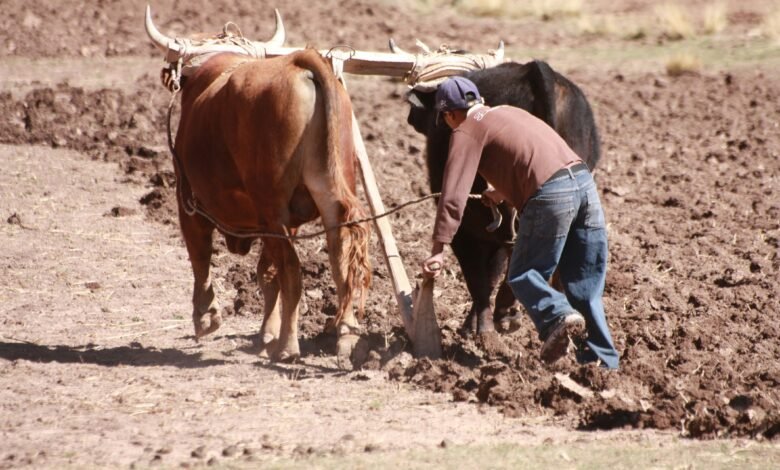
When permanent settlements became a thing so did agriculture shortly after. Guess some people experimented with putting some seeds in the ground and, voila, after some time stuff came out. You could make a civilization out of this![1] It’s still impressive to me how they even managed to invent this. Like, they noticed that if a seed falls to the ground, a whole plant pops up months later, and they still managed to make that cause-and-consequence connection, even with all that time in between. It’s quite intelligent and revolutionary, if you think about it.
And guess who invented the whole thing? Women![2] Yup! In the early settlements women weren’t just the ones tending the fields with men but were likely the ones who kickstarted agriculture, the original farmers. Of course, men joined them shortly after since the work was very labor intensive and every hand was necessary for tilling the ground. This also meant that women’s work in early agrarian and no-plow societies was valued equally to that of men.
It is also important to note that in these societies, fertility (of crops, animals, and people) meant survival and women’s biological role in childbirth made them natural symbols of life and fruitfulness. This is possibly another factor that gave women a somewhat special status in the eyes of these cultures. It was not unusual for art and figurines from those times to depict goddesses and other symbols of female power.
But now with the emergence of permanent settlements property starts being something to worry about. It is no longer shared between the larger group and you can’t just move and find more resources once you don’t have previous ones. Accumulation of possessions also meant better quality of life and more respect within the group. Now there’s something to protect, accumulate and pass down to the next generation. For all the aforementioned reasons, in the societies that didn’t use the plow, inheritance was often passed down through the mother’s line, from female to female. However, this is all going to change once the plow gets invented.
Plows were much more efficient than hoes and digging sticks, but they demanded serious upper body strength, grip and quick bursts of power to either pull the plow or handle the animals pulling it. This gave men enormous advantage over women because guys tend to have more muscle mass and stronger arms. Farming slowly shifted from a family job to mostly men’s work, while women started managing things at home.
As men became tied to their farms, it naturally made more sense for wives to leave their own families and join their husbands’ households rather than the other way around. This meant that women got regularly displaced from their centers of social influence and placed into new, unfamiliar family environments. Over time, this shift helped men gain dominance over women and led to the rise of patriarchy, where inheritance and family lines were traced through the male descendants. Around the same time, male gods rose to prominence while goddesses gradually faded from the spotlight.
There are also communities that became patriarchal for other reasons, like those that engaged in lots of wars. In such civilizations men also became dominant due to their strength and capacity for lethal violence. War required a steady supply of manpower, so women stayed at home and gave their all to making and raising children, especially sons. These societies specialized in building deep bonds and trust between their men because survival literally depended on it. On the other hand, women were mostly confined to the home and had few chances to form any networks, which left them with even less power and influence.
Whether it be because of the plow or warfare the fact is that patriarchy lasted for thousands and thousands of years uninterrupted. This was mostly because about 90% percent of society was agricultural for most of human history. It was only with the rise of the Industrial Revolution (and later the widespread availability of birth control) that women finally began to gain equal rights. The Industrial revolution didn’t exactly invent feminism but it set the stage for it. As work moved out of the home and into factories, women were brought into public life. Massive urbanization made it easier for women to form social groups, share ideas, and organize movements, including early feminist movement. And perhaps most importantly, the invention of birth control gave women something they had never had before: the ability to make decisions about their own bodies and futures.
Now this is just the beginning of a much more convoluted story about how women got their rights which I’d love to explore more deeply in a future post. So, if that’s something you’d be interested in, please let me know. I appreciate your feedback a lot! 🙂
Conclusion and my thoughts
The current research is clear: the main reason for female oppression throughout centuries is the plow. Personally, I’m very skeptical of overly simple solutions that explain complex social issues and dynamics. I do trust the current findings, since the evidence does seem to show the plow playing a major role. Still, I find it hard to believe that it was the only factor at work. As we’ve already seen, some societies became patriarchal not because of farming tools but because they were constantly at war, or for entirely different reasons. It’s also important to keep in mind that gender and power are topics a lot of people, including researchers, are personally invested in. This means we should stay aware of any potential biases that researchers might bring into their work. So, while I’m open to the idea that I might be wrong and we just solved this whole issue with plowing, I’m still looking forward to seeing more research on this topic. The story of how female subjugation developed over time is, in my opinion, too important and too complicated to settle just yet.
But you tell me…do you agree? Do you disagree?
Euralēthia
Read more at: https://www.nexingen.com/how-why-women-became-oppressed
References:
[1] A silly reference to the video „history of the entire world, i guess” by bill wurtz: https://www.youtube.com/watch?v=xuCn8ux2gbs
[2] Roth, Barbara. (2006). The Role of Gender in the Adoption of Agriculture in the Southern Southwest. Journal of Anthropological Research. 62. 513. 10.3998/jar.0521004.0062.404.



